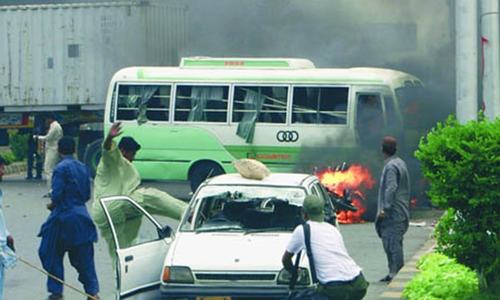KARACHI: Expressing displeasure at police and judicial magistrates over disposal of cases under ‘A-class’, the Sindh High Court has directed the Sindh prosecutor general and the inspector general of police to furnish details of cases in which A-class reports were filed in courts across the province.
The A-class reports pertain to those cases in which accused persons are unknown or untraceable.
The court also asked top officials of police and prosecution to communicate a 2016 judgement (Nasrullah vs. SHO) of the SHC regarding A-class reports to their departments and file complete record of such cases during the last 10 years.
IGP, prosecutor general reminded of a 2016 judgement regarding A-class reports
It also directed the member inspection team (MIT) of the SHC to call reports in this regard from judicial magistrates.
The bench, headed by Justice Salahuddin Panhwar, observed in its order that it was believed that the magistrates and subordinate courts had no knowledge of the judgement about A-class cases and ordered recirculation of the judgement to all criminal and special courts.
“The SSPs all over Sindh, who are bound to supervise the investigation of cases, must depute teams of competent officers to monitor the investigation of A-class cases and file reports before magistrates on fortnightly basis while magistrates are competent to take any coercive action against the delinquent officials in case of non-compliance,” it added.
These directions came during the hearing of an application in which the applicant submitted that he lodged an FIR at the Ferozabad police station, but police failed to arrest the accused and filed an A-class report.
The applicant added that he had received some information about the accused and approached the district and sessions court concerned for reinvestigation, but the plea was dismissed on the ground that the order passed by a magistrate on the police report was not amendable.
The bench directed the SSP concerned to entrust the investigation of the case, lodged by the applicant, to any other officer to conduct a probe, record further statement of the victim and others, if any, and file a report before the competent court in accordance with the law.
It observed that as per the judgement in the Nasrullah case, a report under A-class was not the final or legal disposal of a criminal case as the investigation was continued till the crime was solved and guilt or innocence was determined by the court.
It said that the responsibilities of police and of the magistrates, who otherwise were ultimate authority and have the supervisory jurisdiction, did not come to an end by filing such papers alone.
Referring to a recent judgement of the Supreme Court, the bench stated that no investigation can be said to have been completed unless the culprits were identified. A report under A-class will never be an admission of completion of the investigation and, therefore, no question regarding legal disposal of such cases was raised, it added.
“The attitude of police to believe about disposal of cases under A-class was not only illegal but also against the spirit of investigation while active awareness of magistrates in dealing with such reports was also found to be not in accordance with [supervisory] role,” it added.
The bench further observed that as per the judgement in the Nasrullah case, the magistrate was bound to call the investigating officer and the victim with regard to the progress in the A-class cases fortnightly, but the magistrate in the present case failed to follow these directions while the district and sessions judge concerned also seemed to have not pursued the guidelines.
Published in Dawn, December 23rd, 2018












































